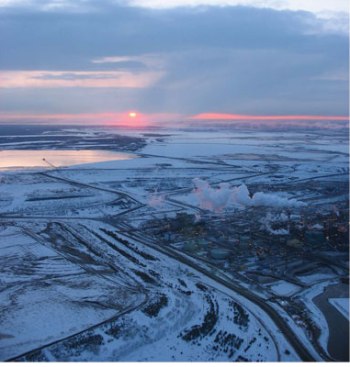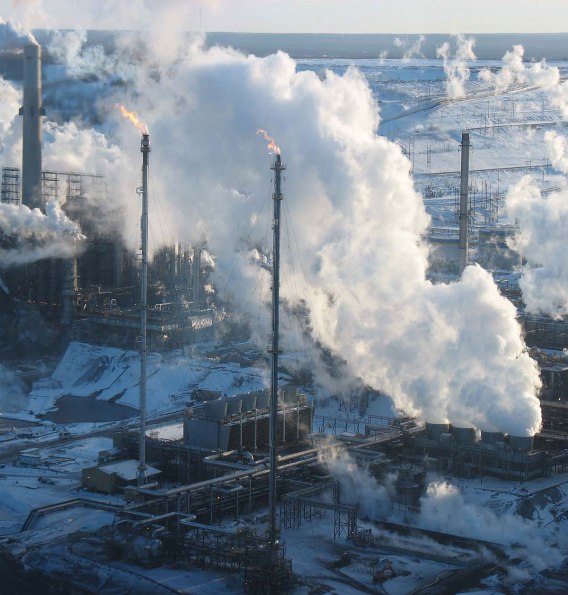Canada’s tar sands have been internationally criticized as one of the world’s largest industrial sources of greenhouse gases, but the energy-intensive extraction of oil also has a less-noted impact on the local environment. A new study in the Proceeding of the National Academy of Sciences (PNAS) shows that the Alberta’s oil sands are likely releasing more PACs (polycyclic aromatic compounds) into nearby Athabasca River and its tributaries than the industry-funded and government-supported Regional Aquatics Monitoring Program (RAMP) has reported.
Sampling widely in 2008, researchers found that snow was contaminated with PACs for almost 50 kilometers around the oil sands complex. They also found that dissolved PAC contamination was higher downriver than upriver of the oil sands project.
 Oil sands development located on the west bank of the Athabasca River. 19 March 2008. Photographs courtesy of Erin Kelly. |
“Some residents of downstream Fort Chipewyan are convinced that the oil sands industry is responsible for higher than expected cancer rates,” explain the study’s authors. “However, government, industry and related agencies, relying in part on the joint [RAMP], report that effects are minimal.” RAMP also claims that the heavier-than-normal concentrations of contaminants in the Athabasca are naturally-occurring and not due to the mining of the oil-sands.
The study found that contamination levels of PACs were higher in the summer than the winter. Summer levels were high enough to cause toxicity to the rivers’ fish, including deformities, lower growth rates, sexual hormone deficiencies, and even death.
The researchers argue that RAMP, which has monitored the aquatic ecosystems near the oil-sands project since 1997, must be overhauled considering the program has “missed major sources of PAC to the Athabasca watershed”, according to the paper.
“[RAMP] lacks scientific oversight, and a peer review severely criticized its ability to detect effects. RAMP data are not publicly available, and the methods used to analyze, interpret, and report the data are not entirely transparent,” the researchers write.
Extracting oil from the oil-sands (also known as tar-sands) is both difficult and energy intensive. The oil—which exists in the form of bitumen and is mixed with clay, water, and sand—must be extracted from the ground by using hot water and upgraded by using a high energy process. To make a single barrel of oil two tons of oil-sands and three barrels of water are required.
A critic of the project, writer and activist George Monbiot, recently visited the oil sands.
“Already it looks like a scene from the end of the world: the strip-miners are creating a churned black hell on an unimaginable scale,” Mobiot wrote in the Guardian.
Citation: Oil sands development contributes polycyclic aromatic compounds to the Athabasca River and its tributaries. Erin N. Kelly, Jeffrey W. Short, David W. Schindler, Peter V. Hodson, Mingsheng Ma, Alvin K. Kwan,
and Barbra L. Fortin. PNAS. www.pnas.orgcgidoi10.1073pnas.0912050106.

Oil sands development located on the west bank of the Athabasca River. 28 February 2008. Photographs courtesy of Erin Kelly.
Related articles
Has Canada become the new climate villain (yes, that’s right, Canada)?

(12/02/2009) In 2007 American delegates to a climate summit in Bali were booed outright for obstructing a global agreement on climate change. Then in a David versus Goliath moment they were famously scolded by a negotiator from Papua New Guinea, Kevin Conrad. “If for some reason you are not willing to lead, leave it to the rest of us. Please get out of the way,” Conrad told the American delegates. However, much has changed in two years: the United States, under a new administration, is no longer the climate change pariah. The US has recently announced emissions cuts, negotiated successfully with China on the issue, and will be attending—Obama included—the Climate Change Summit in Copenhagen next week. Obama and his team probably don’t need to worry about being booed or remonstrated this time around, but that role may instead go to Canada.
Fossil fuel subsidies “bringing us closer to irreversible climate change”
(11/06/2009) The Green Economy Coalition is urging G20 finance ministers to rapidly put an end to fossil fuel subsidies. In a letter to the ministers the coalition argues that these subsidies are contributing directly to climate change and making it difficult for the world to transition to a greener economy.
Canada and Britain abandon conventional coal
(04/29/2009) In an effort to curb climate change, both Britain and Canada have announced plans to stop building new conventional coal power plants, a move long-advocated by environmentalists. Both nations have turned their sights to the possibility of clean coal, a controversial and still unproven method that has divided environmentalists, scientists, and policy makers.